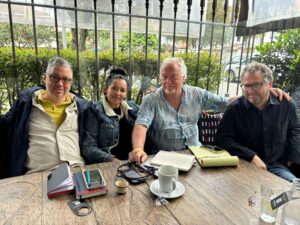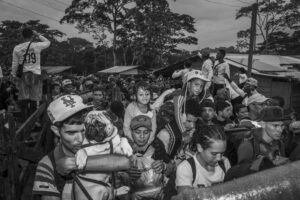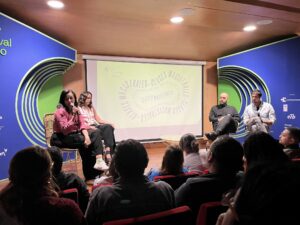A piercing sound of thunder, rain and crying accompanies the warning 'this film contains disturbing images.’ Fear and anguish cross the screen showing the reality of hundreds of people, mostly children, who risk their lives crossing the "jungle of death," as the Darién Gap, located between Colombia and Panama, is known.
In April 2024, Italian photographer Tommaso Protti, Colombian-American journalist and producer Natalie Gallón, filmmaker Fabrício Brambatti, and paramedic Adam Creighton led a six-day expedition along one of the most dangerous immigration routes in the world.
The result was the short documentary "El Maldito Darién," the cover letter from Boom, a new digital journalism platform that explores key topics such as migration, democracy and the environment in the Americas.
The official presentation of this project took place within the framework of the Gabo Festival in June 2024. Its founders are big names in journalism about Latin America: American writer and war correspondent for The New Yorker, Jon Lee Anderson; Venezuelan cronista, editor and founder for Opinion at the now-defunct NYT en Español, Boris Muñoz; Chilean writer, journalist, political analyst and founder of The Clinic, Patricio Fernández; and Brazilian journalist and screenwriter, Carol Pires.

Journalists Boris Muñoz, Carol Pires, Jon Lee Anderson and Patricio Fernández are the founders of Boom (Photo: courtesy).
“In the difficult political situation that we all face, we want to see a way, using multiple creative and journalistic genres, to move the needle,” Anderson said at that launch. “To see if, through Boom, we can be a phenomenon that helps oxygenate the environment.”
Upon entering the platform, the first thing the reader sees is a black background with the name Boom in white letters. Suddenly, the number and size of the letter “o” increases, imitating a pop or explosion.
Then the reader can navigate through the different sections: “Audio” and “Visual” where the team hopes to publish podcasts, photographs and documentaries like the one about Darién; “Ideas” where they publish opinions, analysis, reflections and proposals; “Journalism” that includes features, crónicas, investigations and interviews; and finally, the “Curated” section where the team shares content from other media.
“We wanted to create a platform of ideas that had opinion at the center, but at the same time allowed a renewal or a bet on great journalism,” Muñoz told LatAm Journalism Review (LJR). “Boom is not just a website, I see it as a kind of supernova that explodes and creates a universe.”
At Boom, there is room for everything. They even publish what they classify as “throwbacks,” which are republications of articles from journalism masters like Gabriel García Márquez. “In some way, the three of us are linked by García Márquez, who is like a patron saint of Latin American journalism,” Muñoz said.
Migration, the environment and democracy
As Pires, director of “El Maldito Darién,” told LJR, the Boom team wanted its first publication to be the result of a multidisciplinary expedition.

"El Maldito Darién" is the cover letter from Boom, a new digital journalism platform that explores key topics such as migration, democracy, and the environment in The Americas. (Photo: Tommaso Protti/2024 Darién Gap expedition)
At first, covering the Amazon was on the table. However, the creators of Boom leaned more toward coverage of the Darien since migration is “the big issue of this decade on the continent,” Pires said.
Pires told LJR that she opted for a more emotional rather than informative film when choosing the team profile, but that she did not want to send just men on the expedition. So she invited Gallón, who had already made the Darién crossing for CNN.
“When the project came to me, it was something I had not thought about doing again. But they were giving me all the poetic license and I thought, 'wow. How incredible to be able to report it in a more personal way, as a woman, very striking, and in Spanish,'” Gallón told LJR.
As a result of the Darién expedition, Boom also published the podcast ¡No vengan! (Don’t come!), a photographic series and an interactive map of the route.
In addition, they posted a text about the complications that can become deadly dangers for migrants in the jungle and an opinion article about how U.S. politicians handle the immigration issue.
“We didn't want to do the traditional narrative and rain on the wet, we wanted to go further and create something that was an immersive experience,” Muñoz said. “Behind every migrant there is a tremendous drama.”
In addition to migration, other thematic focuses in Boom are environmental protection and the defense of democracy.
Some of the texts published around these topics have been: The future of Venezuela will be decided in the streets; The bicycle, an ally of the cities of Latin America; In a warming world, the water crisis in the Amazon must be resolved, among others.
“In the defense of democracy, we are not objective and impartial journalists,” Muñoz said. “Without democracy, journalism is greatly diminished, there is no possibility of journalism in all its potential without a democracy that protects it.”
The future of Boom

The official presentation of Boom took place within the framework of the Gabo Festival in June 2024. (Photo: Fundación Gabo)
Boom is in the pilot phase and is still defining its editorial and business model. It already has the financial support of the Open Society Foundations, which has allowed for the creation of the current products and the hiring of Chilean designer Constanza Gaggero and Belgian creative programmer Valentin Jadot, as part of the team.
The future plan, according to Muñoz, is to cover the entire American continent, not just Latin America, and to be able to publish all journalistic products in three languages: Spanish, English and Portuguese.
Although it started as a web platform, its co-founder hopes that Boom will become a hub for ideas and journalism in the region and also outside the online world. That is, holding conferences, forums or meetings where social issues are debated.
“We want our work to generate a transformative footprint and really have an impact on society,” Muñoz said.